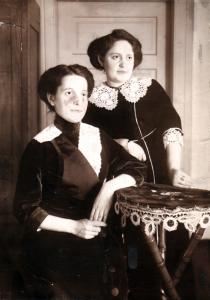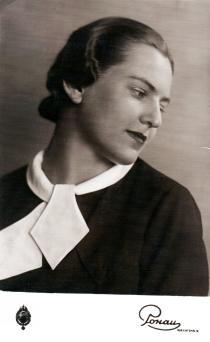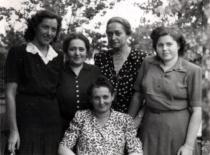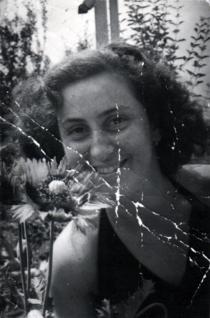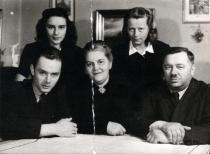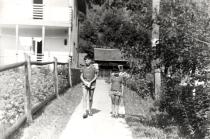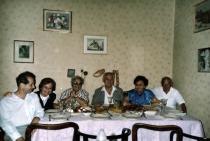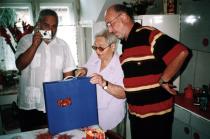This is me in the summer of 1943 in Kolozsvar.
I was already a good swimmer by the age of five. My father taught me to swim by throwing me into the deep waters of the Szamos in Des, at a spot where even he couldn't touch the bottom. Then he said, 'Now come out', and I did. I discovered that the water kept me afloat, and I learnt to swim.
I had a Jewish boyfriend called Dery, whose parents were furriers. They had a house at the end of Donat Street, on the banks of the Szamos, and every summer we went there to bathe. Their garden gave onto the Szamos, so we weren't bothered by anybody while bathing.
I was a sportswoman - that's what I was interested in. The Jewish community from Kolozsvar had a sports club, the Hagibor [Hebrew: The hero], which had several sections: soccer, Ping-Pong, tennis, water polo and fencing. Hagibor had many young and reputed athletes. There were, for instance, the Eros brothers. The younger brother of Laci Eros, Csibi, was a foil fencer and even took part in European Championships. Laci was a sabre fencer and a water-polo player. My cousin from Brasso, Geza, married the sister of the Eros brothers. They brought me into the Hagibor. At the end of the 1930s, the Hagibor won the national Ping-Pong championships. I was on that team, and so was one of my girlfriends, Eva Weisz. I was placed first in Ping-Pong at the Balkan Championships in international doubles with Sari Kolozsvari, in 1939. There were no Christians at Hagibor, except for one athlete, a Ping-Pong player called Vladone, who used to come to our club. We were happy to have him. I think he even won the national championships. Because I was one of the best defensive players, I also trained with the boys, including Vladone.
I was pursuing other sports as well: skiing and swimming, but these were only for fun, and after 1940, when the Hungarians came, we had to stop. The anti-Jewish laws prohibited the athletes of Hagibor from participating in any competition, so we couldn't compete.
My friends were from the Hagibor. One of our friends, Marcell Roth, whose father was a wealthy pharmacist, had a phonograph. He had beautiful classical music and opera records. One afternoon every week, we gathered to listen to music. There were people among us who were connoisseurs of music, and talked about the piece we were listening to. We knew all the great composers, symphonies and operas. In another circle of friends we used to talk about books, and everybody talked about what they had read most recently. Due to the limited possibilities we had after the Hungarians came, that's how we lived. We used to go on trips with our friends, but not very long ones. For example one day we went camping at Lake Cege with tents and returned home the next day.

